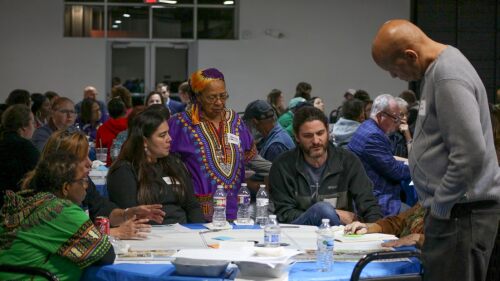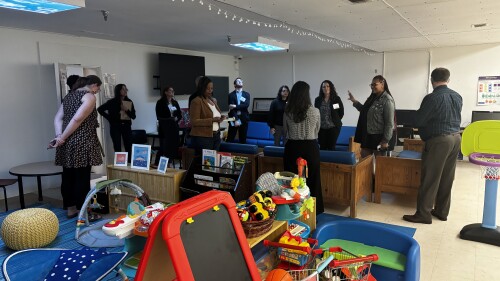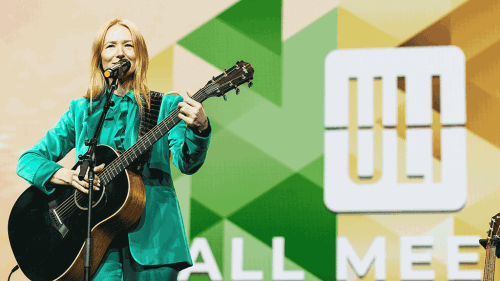Faron A. Hill, president of Peregrine Oak, an Atlanta-based advisory services and capital markets firm, was appointed ULI Foundation chair on July 1.
Since joining ULI in 2004, Hill has volunteered his time and talent, serving in leadership roles that include chair of the ULI Atlanta Young Leaders Group (YLG) and cofounder and co-chair of the ULI Atlanta Capital Markets Council. He currently also serves on the Global Board of Directors, as a Governing Trustee, as chair of the ULI Foundation Board, and in the Technology and Real Estate Council leadership.
Douglas D. Abbey, longtime ULI leader and past Foundation chair, says he is “very impressed” with Hill’s background in finance because it is critical to the chair role, which includes responsibility for the prudent investment of the Foundation’s financial assets.
“He has been one of the most active, engaged members of the Foundation Board, taking on any task with a tremendous amount of enthusiasm, and all times of the day ready to take a phone call to work on Foundation matters,” Abbey says.
Simon Ziff, fellow ULI member and president and cofounder of the Ackman-Ziff Real Estate Group, met Hill when they were original members of the Technology and Real Estate Council leadership team.
“We hit it off and have focused on joint business efforts since. My office is his first or last stop whenever he visits New York. It has been great getting to know him professionally and personally. He will do well in this new role,” said Ziff.
Hill earned MBAs from the SC Johnson College of Business at Cornell University and the Smith School of Business at Queen’s University in Kingston, Ontario. He received his undergraduate degree from Troy University. In advance of the first in-person Fall Meeting in two years, Urban Land sat down with Hill for a wide-ranging conversation to learn more about his work at ULI, how he decided on a career in commercial real estate, and what his plans and priorities are over the next two years in his role as Foundation chair.
Growing up in Holt, Alabama, did you know that you would one day make your career in commercial real estate finance?
Not a clue whatsoever; the plan was to become a physician. Most individuals enter commercial real estate by way of genetics or happenstance. For me, it was definitely by accident. My first job out of college was in banking. I found my way to economic development from banking, which gave me a soft introduction to commercial real estate. From economic development, my next stop was business development with BellSouth, which brought me to Atlanta [in 1999]. After my time at BellSouth, I formally entered commercial real estate—specifically, working as an intermediary arranging financing for transactions. Call it divine intervention: the training and experience from my previous stops combined were all immediately useful and proved to be very valuable.
What about commercial real estate drew you to it as a profession?
The daily challenges are different: no transaction, client, or interaction is identical. I learned early in my career that no two days in this business will ever be identical.
Commercial real estate is a quality-of-life business as much as it is a relationship business. Placement, design, use, and functionality decisions for assets are made with the end-user in mind. But, of course, financial feasibility precedes all of these decisions. It has also allowed me the opportunity to meet some fascinating people and collect several lifelong friends.
Is the commercial real estate industry generally, and ULI specifically, in a greater position now more than ever to lead and to come up with the solutions for the daunting challenges that the world faces?
Absolutely! The success of the Foundation is vitally important for this very reason. A larger, well-funded Foundation places ULI in a much stronger position with the requisite resources to address these issues. The three priorities for the Institute are climate change, affordable housing, and education. Regardless, for every land use–related issue, ULI has the expertise to address the challenges. We have a global membership of more than 45,000. We have a vibrant and well-staffed district council network. We have forward-thinking discussions around problem-solving via our product council network twice every year. We have an active Advisory Services staff conducting panels throughout the year. Without question, ULI should be at the front of these discussions.
When and why did you decide to join ULI?
In 2003, I searched for industry organizations to get involved with, and someone mentioned ULI. So, I went to the ULI Atlanta website, signed up for a YLG event. The event was being held at the Bucket Shop. I walk in, and I immediately notice the wall decorations are orange-and-blue [Auburn] football jerseys. I’m an Alabama fan, so I paused for a moment. But, I have to say, I met some incredible people and had some excellent conversations. However, if the next outing had been at the same bar, I probably would not be sitting here today!
Seriously, the decision to join was a no-brainer. I appreciated the fact that there was an expectation that came with membership as well. A small group of us joined ULI Atlanta around that time who are leaders at the national and district council level today.
What are your thoughts about community service and philanthropy?
We have all heard the “pay your civic rent” cliche many times. Regardless, it is true. We all have a responsibility to support organizations and causes that speak to a higher calling. ULI is undoubtedly one of those organizations. A singular personal priority for me is to add value in every situation—to attempt to leave things better than they were when I arrived.
What do you plan to bring to the role of chairman of the ULI Foundation?
Growing the Foundation is always a priority! To serve in this role is one of the greatest honors of my career to date.
What I plan to bring to this role is to continue the great work that past leaders like Doug, Jim Klingbeil, Tom Toomey, Ron Terwilliger, Randy Rowe, and Owen Thomas have done to create an organization that is going to be around for another 50 years for the Foundation, and then another 83 years within the Institute itself. The ability to add one or two bricks to the Foundation that those guys have built is extremely humbling.
We have work to do from an exposure perspective at the district council level. There is work to be done that is ongoing from a donor and donation perspective. ULI is an excellent story. It is a fantastic group of people. But as Doug reminds me, it is our collective responsibility to go about sharing that story globally. There is a place for every member within the Institute. Every member should find something in the ULI universe that they are passionate about and willing to write a check to the Foundation to support, and feel good about doing it.
In your opinion, what can ULI do to address the issue of inequity as an organization?
First, it is essential to recognize that inequity exists. Second, and most importantly, a commitment to addressing and resolving the issue. ULI is committed to addressing inequality within the Institute and within the industry as well. Let me point out that ULI’s efforts began with WLI, the Women’s Leadership Initiative. If the same commitment and energy are given to the diversity, equity, and inclusion [DEI] initiative, it will be very impactful. Industrywide, particular emphasis must be placed on the “I,” or inclusion, for these initiatives to be sustainable.
SIBLEY FLEMING is editor in chief of Urban Land.






